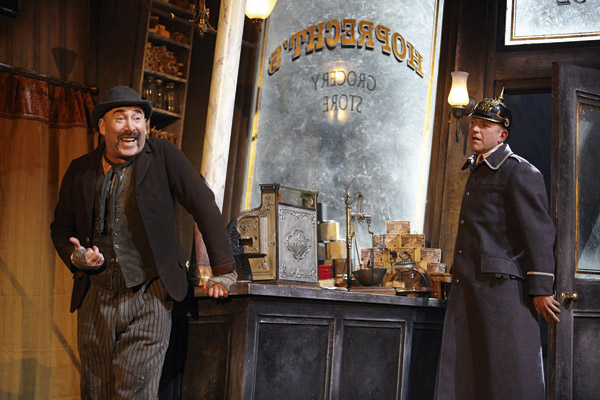A new play about the banking crisis at the Bush. Writer, Clare Duffy, has spent a year or two badgering financiers and economists with questions about ‘the fundamentals’. ‘What is the value of money?’ she asks. ‘What do we want and need money to be?’ Her play has lots of zing and energy, and opens as a TV game show. The audience is divided into teams and individuals are hauled out of their seats and asked to engage in sporting contests with a big stash of 10,000 pound coins that gleam in coppery piles on the stage.
Then the show becomes a drama. We’re in 2007. Two bankers, Queenie and Casino, hatch a scheme to short the American housing market. A tiny investment of £5 million will net billions, should the bubble go pop. Queenie’s angry, foul-mouthed bosses are too thick to see the merits of the plan, so she and Casino start a private hedge fund and secure the backing of a rich investor. The trick works. Markets tumble. They make millions. But then Casino sticks all his loot into Lehman Brothers, which goes bust overnight.
The passages of drama are interrupted by more noisy games between members of the audience, and the constant flip-flopping between genres suggests a fatal flaw in the play’s conceptual DNA. My guess is that Duffy hadn’t enough talent or interest to discover the truth about banking so she sketched out a few scenes between greedy, shouty City thugs and filled in the gaps with game-show trivia hoping to conceal her lack of commitment to her subject. Didn’t work, I’m afraid. Nor did her attempt to transcribe a Latin motto from the side of a pound coin. It’s nearly there but not quite.
The Bush deserves praise for backing a sound theory: get a playwright to interview bankers and create a drama about money. But the results are no better than if Nigella interviewed Sepp Blatter and baked a cake about football. And it’s hard to identify the show’s target audience. It might appeal to youth but its coarse language will disqualify it from schools. It might appeal to age but its lack of imaginative insight will disqualify it from the attention of grown-ups. A drama that starts with questions but fails to supply answers restricts itself to the role of a charming and inquisitive baby.
Adrian Noble and Antony Sher have salvaged a little-known satire, The Captain of Kopenick, from obscurity. Playwright Carl Zuckmayer is best known as the co-author of Marlene Dietrich’s breakthrough movie, The Blue Angel. In this gentle spoof, he introduces us to a wily buffoon, Wilhelm, who serves a prison sentence and then embarks on a Kafkaesque mission to acquire some identity papers. After a mix-up, he’s mistaken for a senior army officer. Scenes of hilarity follow as he uses his borrowed status to reveal that uniformed authority is shallow and corrupt. This is hardly news. And Zuckmayer’s specific target here, Prussian militarism, is a hierarchy that breathed its last exactly 95 years ago in 1918. True, it seemed to be on the brink of a comeback in 1930, when Zuckmayer wrote this toothless lampoon, but its reappearance turned out to be far scarier and more destructive than Zuckmayer had imagined. This puts modern audiences in an unhelpful relationship with the material. We know far more than the writer and his characters about the subject under inspection. It makes for a slow evening.
Antony Sher plays Wilhelm professionally enough but he can’t disguise his limitations as an actor. A narrow range is, of course, no bar to greatness. Gielgud painted his dramatic portraits from an extremely small palette of effects. But Sher’s shortcomings are redoubled by the assumptions they cause us to make. For starters, he looks comical. He’s plump and short with bird-like features and darting fretful eyes. So we expect him to be a great clown. Sure enough, he has everything a clown needs apart from comic graces. And his voice lacks power or clarity. Its reedy, plangent qualities make it a suitable instrument for communicating great depths of intelligent suffering. That’s where Sher’s strengths lie. The character of Wilhelm, a quick-witted scallywag, calls for a rough-and-ready burlesque everyman like Stanley Baxter or Ronnie Barker, or even Brian Conley or Lennie Henry. Sher’s watchful, considered performance may be technically accomplished but he’s on a journey he should never have started.
Oodles of cash have been spent salvaging this extinct curiosity. Everything is lavish, handsome and squeaky-clean. Designer Anthony Ward has created an ingenious, multilayered set that unfolds with the intricacy of a watch and reveals an array of locations, from an opulent bank to a musty old dosshouse. I can’t recall seeing a play that was quite so exquisitely presented and quite so pointless.







Comments